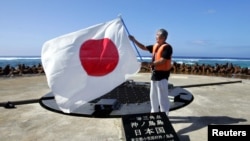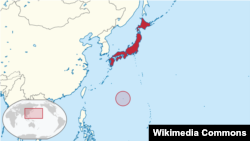Taiwan and Japan are working toward shared access to rich fishing waters around the mid-Pacific isle of Okinotori in a move that could draw strong Chinese criticism.
On Monday, the two governments opened talks toward an agreement that may eventually let Taiwanese boats use the waters around the nearly submerged feature about 1,740 kilometers south of Tokyo.
Japan holds the islet, nestled in a tropical lagoon and anchored by a research station. Japan believes the claim confers an exclusive economic zone in the sea 370.4 kilometers around Okinotori. Taiwan says its fishermen should be allowed to use the area as international waters.
China, however, sees self-ruled Taiwan as part of its territory rather than as a state with rights to negotiate with outside governments. It also disputes Japan’s control of Okinotori.
“I think they would stress that such an agreement violates the one-China principle and is detrimental to China's sovereignty,” Taiwan Strategy Research Association fellow Fabrizio Bozzato said, referring to Beijing’s claim that Taiwan and China belong under one flag.
“They might even decide to use their fishing fleet to make a statement," he said.
China and Japan grapple with their own list of political issues as well, including sovereignty of ocean tracts between Shanghai and the main Japanese islands.
Taiwan, which has one of the world’s biggest ocean fishing industries, opened talks with Japan in October 2016 over Okinotori after Tokyo detained a Taiwanese fishing vessel near it. On Monday and Tuesday this week, negotiators reached a tentative agreement after a second round of talks on Okinotori.
“Although the two sides still have different views, they both agreed to continue dialogue on the issue of fishing activities on the principles of protecting the safety of work as well as fishery resources,” Taiwan’s Foreign Ministry said in a statement.
In July of 2016, a world arbitration court ruled against Beijing’s right to use occupation of tiny land features for control of about 90 percent of the South China Sea.
Japan says its occupation of Okinotori should give it the same kind of zone in the Pacific Ocean. But no one has legally challenged that idea as the Philippines challenged China -- leading to the arbitration verdict.
Since China rejected the arbitral ruling, it would struggle to criticize Japan’s claim of Okinotori based on its size or close to the water’s surface, said Jonathan Spangler, director of the South China Sea Think Tank in Taipei.
“They can say it’s not Japanese for other reasons, but they can’t say it because of the size of the island or the type of the island,” he said.
A year before the world court ruling, Chinese Foreign Minister Wang Yi told a meeting of Southeast Asian nations that “China is different from Japan” in that his country’s “claim over rights in the South China Sea has long been in existence.”
China is expected to protest any Japan-Taiwan deal by arguing Taiwan lacks the rights to sign agreements as a state, analysts say. Chinese officials already resent Taiwan President Tsai Ing-wen, who has declined to accept Beijing’s “one-China” idea as a condition for talks. China hopes talks will advance its goal of unifying with Taiwan.
Common Taiwanese want a foreign policy laurel showing their government can stand apart from China, adding significance to any Japan deal, said Liu Yih-jiun, public affairs professor at Fo Guang University in Taiwan.
“Simply the sit-down and signing something with an important country in the world like Japan will boost the current Tsai administration, so for sure Taiwan needs politics at this moment, but China for sure doesn’t like it at all,” Liu said.
China might react to any Japan-Taiwan agreement by sending military planes near Okinotori, said Shane Lee, political scientist at Chang Jung Christian University in Taiwan. Those missions would collect information and pressure Taiwan to drop its claims, Lee said.
New flyovers would be consistent with other Chinese aircraft movement this past year over the Miyako Strait between Taiwan and other outlying Japanese islands. Bombers and other planes flew through the strait in November, for instance.
“I think the recent flights of the military planes (are) the prelude to the claim that all this area belongs to China,” Lee said.










